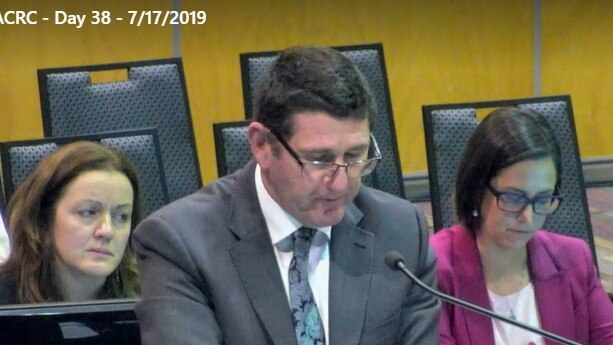Aged-care call: we must lock in staffing levels
Nursing homes should have a mandatory staff-to-resident ratio, the aged care royal commission has heard.

Nursing homes should have a mandatory staff-to-resident ratio that ensures at least three hours of high-quality care a day for each resident, the aged-care royal commission has heard.
Counsel assisting the commission Peter Rozen QC on Friday proposed sweeping changes to improve the standard of the nation’s aged-care workforce.
They included ensuring a registered nurse is present on each shift, making staffing levels publicly available, increasing geriatric training for undergraduate doctors, and ensuring higher minimum standards of training, including in English proficiency, for personal care workers.
“Our hearings to date have revealed the disturbing extent of the substandard care, that there are not enough staff, that there’s never enough time to do the work, that aged-care workers work in poor and sometimes unsafe conditions and lack the training they need to do the work required of them,’’ Mr Rozen said.
After distilling thousands of pages of evidence about workforce issues facing the sector, his first recommendation to the commission was for a minimum ratio of staff-to-resident care. “The ratio should be set at the level necessary to provide high-quality and safe care to the residents in its facility,’’ he said.
The average total care per resident should be between 186 and 265 minutes a day, and include “a minimum of 30 minutes of registered-nurse time per resident per day and at least 22 minutes of allied healthcare per resident per day”.
“Any redesign of the aged-care system that does not remove the incentive that presently exists for providers to reduce the number of nurses they employ to cut their costs will necessarily fail,’’ he said.
Mr Rozen recognised mandatory staffing levels could not be achieved under current funding arrangements. While noting Australia spent a smaller proportion of GDP on aged care (1.2 per cent) than the average of comparable countries (2.5 per cent), he left the issue of funding recommendations to a future submission.
He also asked the commission to consider the establishment of a registration scheme for all personal care workers, with mandatory minimum qualifications and minimum levels of English. This would again be an expensive and controversial recommendation given the costs involved in training workers who are among the lowest-paid in the country. “The royal commission has heard evidence … that more rigorous screening and monitoring of aged-care workers is needed to ensure the safety, health and wellbeing of care recipients,’’ he said.
Advocacy group Leading Age Services Australia, which represents nursing home providers, agreed more nurses were needed as a response to the rising complexity of residents’ needs.
But LASA chief executive Sean Rooney said this couldn’t be done without more federal funding.
“We agree … that realising more staff in aged care is not possible under the current funding system,’’ he said. “The problem is that the average aged-care operator struggles to cover their current costs.’’
Mr Rooney questioned whether mandatory staffing ratios were the best way forward.




To join the conversation, please log in. Don't have an account? Register
Join the conversation, you are commenting as Logout